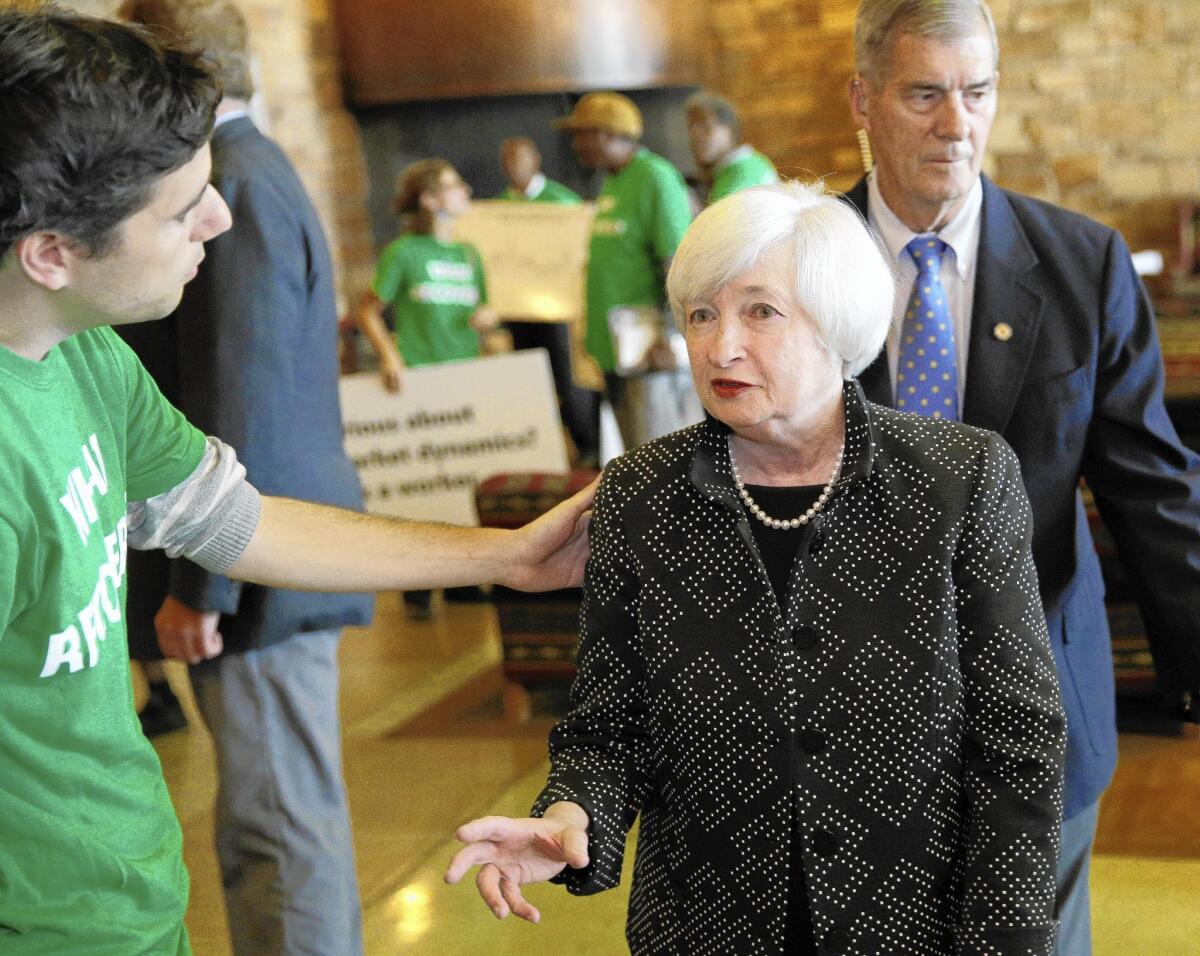Yellen resists pressure to tighten monetary policy more quickly

- Share via
Reporting from washington — Resisting pressure to tighten monetary policy more quickly, Federal Reserve Chairwoman Janet L. Yellen said there was no “simple recipe” for central bank policymakers in deciding when the labor market had improved enough to handle a rise in interest rates.
Economic conditions are improving but the Great Recession was so damaging that it has made assessing the job situation “especially challenging,” Yellen said in an eagerly anticipated speech Friday at an annual Fed conference in Jackson Hole, Wyo.
“In the five years since the end of the Great Recession, the economy has made considerable progress in recovering from the largest and most sustained loss of employment in the United States since the Great Depression,” she said, noting that July’s 6.2% unemployment rate was down nearly four percentage points since 2009.
“These developments are encouraging, but it speaks to the depth of the damage that, five years after the end of the recession, the labor market has yet to fully recover,” Yellen said.
Her speech came as pressure grows on the Fed from some economists to start raising interest rates that have been near zero since late 2008. The minutes of the central bank’s last policymaking meeting showed a growing rift between so-called hawks, who worry rising inflation could hurt the economy, and doves, who want to continue the unprecedented easy money policies until the job market is stronger.
“The Fed’s inflation hawks are rattling the cages, advocating for a rate hike this year,” said Paul Edelstein, director of financial economics at IHS Global Insight. “The mainstream of the Fed prefers waiting until 2015.... As Yellen stressed, the decision will be data-dependent.”
Stocks were flat after the speech but dropped later on news of a flare-up in tensions between Russia and Ukraine. The Dow Jones industrial average closed down 38.27 points, or 0.2%, at 17,001.22.
Yellen reiterated Friday that the Fed was on schedule to end its bond-buying stimulus program in October. Known as quantitative easing, the policy has more than quadrupled the central bank’s balance sheet to $4.4 trillion since 2008.
As that effort ends, some hawks inside the Fed want to act soon to start raising its benchmark short-term interest rate. The Fed has kept the rate near zero to stimulate the economy by encouraging businesses and consumers to borrow and spend.
Charles Plosser, president of the Federal Reserve Bank of Philadelphia, told CNBC on Thursday that the policymaking Federal Open Market Committee was taking a risk in maintaining its view that short-term interest rates should remain low for “a considerable time” after the bond-buying program ends.
Minutes from the Fed’s July meeting said “some” participants were “increasingly uncomfortable with the committee’s forward guidance” on interest rates.
Plosser, who was the only Federal Open Market Committee member to dissent from the July policy statement, warned Thursday that failure to start raising interest rates soon could force the central bank to raise them more quickly later, which could be traumatic for the economy.
Yellen, who is known as a dove on inflation, cautioned Friday against the Fed moving too quickly to raise interest rates.
She expressed continued concern about the job situation and said that the sharp drop in the unemployment rate over the last year “somewhat overstates the improvement in overall labor market conditions.”
Yellen cited as negative factors the “sluggish pace” of wage growth, the large number of people who can find only part-time jobs and the historically low level of the working-age population that is employed.
“There is no simple recipe for appropriate policy in this context,” Yellen said.
Fed policymakers “will be closely monitoring incoming information on the labor market and inflation in determining the appropriate stance of monetary policy,” she said.
If the labor market improves more quickly than expected or if inflation picks up, then interest rate hikes could “come sooner” and be “more rapid” than the Fed has signaled, she said.
But if “economic progress turns out to be disappointing,” interest rates could stay low even longer than forecast, Yellen said.
It was notable to Kathy Bostjancic at forecasting firm Oxford Economics that despite Yellen’s dovish view on inflation, the Fed chief also acknowledged the risks in waiting too long to raise interest rates.
“Given that we have been concerned about the Fed falling behind the proverbial inflation curve,” Bostjancic said, “it was reassuring to see Yellen propose a balanced assessment of potential future labor market dynamics and monetary policy response.”
More to Read
Inside the business of entertainment
The Wide Shot brings you news, analysis and insights on everything from streaming wars to production — and what it all means for the future.
You may occasionally receive promotional content from the Los Angeles Times.











